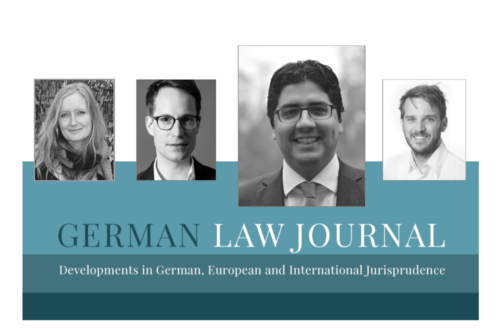
Editorial | Volume 25 No. 4
In September, the German Law Journal celebrated 25 years with a special event in Berlin! Learn more here.
The editors invite you to read the GLJ’s fourth issue of 2024. Publication in issue format has been delayed slightly as a result of Cambridge University Press’ technical disruption this spring/summer, although all of these articles have been available individually on Cambridge Core via FirstView.
Issue 4 opens with an article from Oleksandr Babikov, Valerii Bozhyk, Olena I. Bugera, Serhii H. Kyrenko and Maksym Viunyk, entitled ‘Balancing Interests: Criminal Proceedings & Private Life Interference Under Martial Law in Ukraine’. The authors aim to contribute to the field by conducting a comparative analysis of various approaches to addressing legal regulation issues concerning the use of covert information-gathering methods, and by exploring various countries’ approaches to defining and regulating covert information-gathering activities.
Georgios Anagnostaras’ paper focuses on the Bundesverfassungsgericht judgment on the Next Generation EU Program, specifically how the Constitutional Court’s ‘ambiguous and controversial reasoning’ contributes to uncertainty over the viability of using this kind of funding and financial model in the future, outwith the exceptional circumstances of the COVID-19 pandemic.
The question posed by Gregory S. Gordon and Ryan Martinez Mitchell at the outset of their article is: ‘Should theoretical discourse supporting state crimes be protected as free speech or prosecuted as atrocity speech?’ The authors propose a discussion informed by what they call the ‘Schmitt-Flechtheim confrontation’, that is, the adversarial relationship between the neo-Hobbesian Nazi collaborator Carl Schmitt and the progressive Futurology founder Ossip Flechtheim, and then pull forward these insights into atrocity speech law to more contemporary application vis-à-vis the impacts of Russian academic discourse upon the invasion of Ukraine.
Mirko Forti’s article aims to understand the consequences of algorithmic errors on the lives of migrants, refugees and asylum seekers arriving in the European Union. Considering the impacts of both securitization and increased digitalization of migration management, the author points to how borders are ‘becoming data collection and elaboration sites that serve social sorting processes for security purposes’. The article assesses the adequacy of the EU’s regulatory framework in protecting the fundamental rights of people affected by algorithmic errors at the EU’s external frontiers.
Staying with AI, Marco Almada and Anca Radu conclude this issue with their paper on what they call the ‘Brussels Effect’, namely the expected global standardisation of the EU drive for legislation in this space, notably its proposed AI Act. Posing the question, ‘How the AI Act Can Reduce the Global Reach of EU Policy?’, the authors consider the implications of this legal diffusion for the EU policy agenda.
As always, happy reading.
Jen Hendry on behalf of the GLJ Editors in Chief






